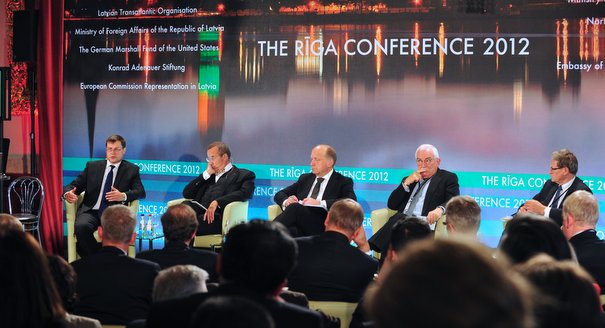Nathalie Tocci, Jan Techau
{
"authors": [
"Jan Techau"
],
"type": "commentary",
"blog": "Strategic Europe",
"centerAffiliationAll": "",
"centers": [
"Carnegie Endowment for International Peace",
"Carnegie Europe"
],
"collections": [],
"englishNewsletterAll": "",
"nonEnglishNewsletterAll": "",
"primaryCenter": "Carnegie Europe",
"programAffiliation": "",
"programs": [],
"projects": [],
"regions": [
"Europe"
],
"topics": [
"EU"
]
}
Source: Getty
A Farewell to Foreign Policy Relevance
Europeans have few illusions about the state of the world. It's the unwillingness to draw conclusions from this, and act on them, that is the problem.
"I am starting to wonder whether India will have replaced Europe as the U.S.'s closest partner by 2050." I received this tweet halfway into the second day of this year's Riga Conference, an annual exercise in mental stock-taking for the transatlantic community in Latvia's beautiful capital city. The tweep sending this message was Hans Kundnani (@hanskundnani), the ECFR's razor-sharp observer of European and Security affairs. He sits on the other side of the large conference room in Blackhead's House, a splendidly re-built Hanseatic brick gem in Riga's old city. My heart sinks. The evening before, we had agonized over dinner about the lack of creative thinking in Europe on foreign affairs, and now we semi-publicly agonize over the pitiful spectacle that is unfolding before our eyes. For what we see and hear is part of Europe's farewell to foreign policy relevance.
Admittedly, conference panels, especially when occupied mainly by government officials and web-streamed in real-time, are of limited value for the debate about deeper political matters. But the community is used to reading between the lines, and this year it certainly wasn't a very pleasant read. The problem with Europeans, clearly, is not a lack of awareness. Contrary to what many observers claim, they are not living in fairy-tale land. Europeans have few illusions about the state of the world, they can read, after all. It's the unwillingness to draw conclusions from this, and act on them, that is the problem.
Speaker after speaker in Riga added to an emerging picture of the world that should shake Europeans out of their foreign policy complacency. It is a picture of the Western post-cold war status quo coming apart. The list of worrisome items is endless: euro crisis turning into sclerosis 2.0, burning embassies across the Middle East, China both assertive and in trouble, demographics going south, Russia in aggressive decline, Turkey growing internationally while deteriorating domestically, NATO slowly turning into an empty shell, an increasingly hopeless situation in Afghanistan, the Sahel turning into the new Afghanistan, Germany in denial about both its strength and its coming weakness, Britain in recession and with severe bouts of great power blues, France struggling with even mild domestic reform, the United States stymied by a suicidal—and, one is tempted to say un-American—loss of domestic political common sense. And this is just the shortlist.
But the depressing take-away from the conference is not the catalogue of worrisome developments, it is the European reaction to it. "Switzerland is not such a bad country", answers a senior former diplomat from a major European country when asked whether the European Union aspired to being a larger version of the Helvetic confederation instead of an international mover and shaker. And he is only half joking, at best. "Maybe we should have a NATO-China Council, modeled after the NATO-Russia Council" someone else suggested, when addressing how Europe can react to the fact that the nexus of global security is moving slowly to the Indian Ocean and South China Sea. Needless to say, the Americans are exasperated. Kurt Volker (@kvolker), former U.S. Ambassador to NATO, and one of the few remaining Europeanists in Washington, receives empty stares when he asks: What is it that we want to achieve together? How can we promote the Western agenda?
To be sure, there are some very outspoken European voices. Take Norwegian Defense Minister, Espen Barth Eide (@EspenBarthEide), who makes the chilling double-statement that symmetric threats are back in Europe, and that Article 5 of the NATO treaty has lost its credibility because European military assets have lost their deterrent power. Take Julian Lindley-French, historian and long-time critic of Europe's historic hard-power forgetfulness: "All elements for substantial rivalry between nations states in Europe are back in place", he says. In that light, one is not sure whether his lament that Europeans have, across the board, cut 30 percent of their defense spending over the last three years is unsettling or reassuring.
The key problem in all this is the appalling lack of ambition Europeans reveal in all areas of foreign and security policy. Europeans don’t seem to want much from the world, or from their own role in it. In the debate, interests are permanently confused with values, and if, at last, a real European interest is defined, nothing follows from it. No one really wants to shape the world anymore to make it a safer, better place that serves Europe's goals. Nobody is willing to act on the insight that a wealthy, democratic, values-oriented, trade-dependent continent is by default a global stakeholder in need of powerful foreign policy tools.
Very little is expected from Germans these days in this respect, for sure. But where are the strategically-minded British and French foreign policymakers? Where is their plea, based on the above assessment, for a more united European foreign policy, including a list of defined interests and a suggestion as to how these interests can be pursued? Where are those politicians who tie their political destiny to the question of a truly strategic Europe, a Europe that draws hard conclusions from a changing world and the challenges it poses?
None of this is new, none of it surprising. But that does not make it any less worrisome. Europe is a historically fragile continent. Endless economic and political efforts are necessary every day to sustain its unprecedented levels of stability, affluence, and freedom. Increasingly, these blessings rely on how we deal with our immediate and wider neighborhood, and with the strategic hotspots around the world. The lack of ambition to act on this is, ultimately, a lack of ambition to survive. But downfall is not an option, especially when one knows how to prevent it from happening. It is this complacency that I found so profoundly unsettling at the Riga conference last weekend.
In this context, my tweeted answer (@jan_techau) to Hans Kundnani was probably too mild: "Yes, and it's not because of a lack of European assets, but because of a lack of awareness, intellectual investment, interest."
About the Author

Director, Europe Team, Eurasia Group
Techau is director with Eurasia Group's Europe team, covering Germany and European security from Berlin. Previously, he was director of Carnegie Europe.
- Can Europe Trust the United States Again?Commentary
- Pre-Reformation Europe and the Coming SchismCommentary
Jan Techau
Recent Work
More Work from Strategic Europe
- Europe on Iran: Gone with the WindCommentary
Europe’s reaction to the war in Iran has been disunited and meek, a far cry from its previously leading role in diplomacy with Tehran. To avoid being condemned to the sidelines while escalation continues, Brussels needs to stand up for international law.
Pierre Vimont
- Taking the Pulse: Can European Defense Survive the Death of FCAS?Commentary
France and Germany’s failure to agree on the Future Combat Air System (FCAS) raises questions about European defense. Amid industrial rivalries and competing strategic cultures, what does the future of European military industrial projects look like?
Rym Momtaz, ed.
- Macron Makes France a Great Middle PowerCommentary
France has stopped clinging to notions of being a great power and is embracing the middle power moment. But Emmanuel Macron has his work cut out if he is to secure his country’s global standing before his term in office ends.
Rym Momtaz
- How Europe Can Survive the AI Labor TransitionCommentary
Integrating AI into the workplace will increase job insecurity, fundamentally reshaping labor markets. To anticipate and manage this transition, the EU must build public trust, provide training infrastructures, and establish social protections.
Amanda Coakley
- Can Europe Still Matter in Syria?Commentary
Europe’s interests in Syria extend beyond migration management, yet the EU trails behind other players in the country’s post-Assad reconstruction. To boost its influence in Damascus, the union must upgrade its commitment to ensuring regional stability.
Bianka Speidl, Hanga Horváth-Sántha











